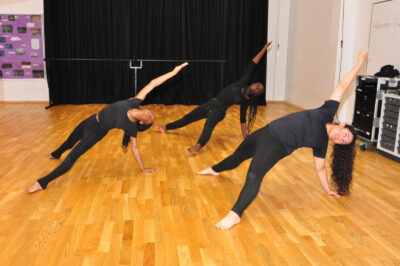 A broad and balanced curriculum is offered to all of our students: underpinned by the academic core of subjects (English, Maths, Science, Humanities and Languages), learning is enhanced by the study of the Arts, computing, technology and physical education, offering our students a course of study in which academic rigour fully prepares them for further education and university.
A broad and balanced curriculum is offered to all of our students: underpinned by the academic core of subjects (English, Maths, Science, Humanities and Languages), learning is enhanced by the study of the Arts, computing, technology and physical education, offering our students a course of study in which academic rigour fully prepares them for further education and university.
In Key Stage 4 (years 10 & 11), all pupils follow an academic core GCSE pathway and then have an enrichment of a choice of subjects from the Arts and Media field. 98% of our pupils go onto further education studying A-level at college.
Core and Compulsory Subjects
The following subjects are studied by all students in years 10 & 11:
GCSE Subjects
- English Language and English Literature
- Mathematics
- Science (Science teachers will advise students on the options; Trilogy or Combined Science)
- Physical Education (This is non-examined CORE PE. Students can also choose GCSE P.E. or BTEC PE)
KS4 Curriculum by Year Group
| Curriculum | Year 10 | Year 11 |
| Curriculum Map 2023-2024 | Y10 Curriculum Map | Y11 Curriculum Map |
|
Curriculum Rationale Summer 2 2023-2024 |
Year 10 Summer 2 | Not Applicable |
|
Curriculum Rationale Summer 1 2023-2024 |
Year 10 Summer 1 | Not Applicable |
| Curriculum Rationale Spring 2 2023-2024 | Year 10 Spring 2 | Year 11 Spring 2 |
| Curriculum Rationale Spring 1 2023-2024 | Year 11 Spring 1 | |
| Curriculum Rationale Autumn 2 2023-2024 | Year 10 Autumn 2 | Year 11 Autumn 2 |
| Curriculum Rationale Autumn 1 2023-2024 | Year 10 Autumn 1 | Year 11 Autumn 1 |
* To be updated with each new term
Subject Support Information for Parents and Carers
KS4 2023/24
Dear Parent or Carer,
Please find some information from our teachers about how you can support your child to achieve the best possible outcomes in GCSE. Asking your child what they have been working on can really help them to identify their own gaps; each subject teacher has given some advice for how you can support your child or some useful websites that you could look at together.
We welcome your support, which is key to the overall success of your child. Please make the most of opportunities to buy revision guides at a reduced price which can be done through Parent Pay.
Thank you in anticipation of your support, and should you require any additional information, please do not hesitate to contact either the teacher or myself.
Julia Stubbs
Deputy Headteacher – Outcomes and Teaching Standards
